25+ Sample Wedding Contracts
-
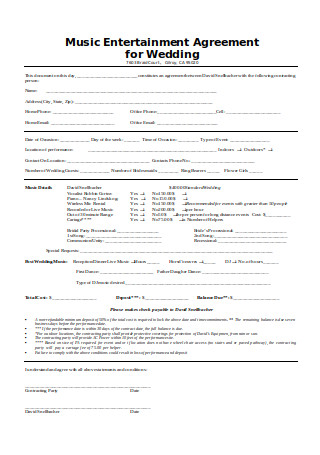
Music Entertainment Agreement for Wedding
download now -
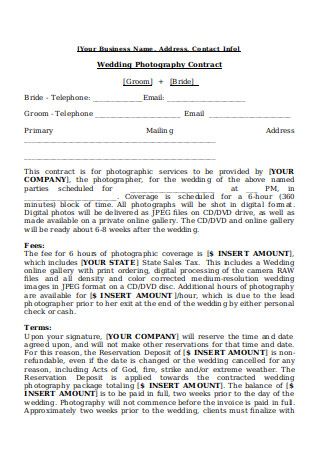
Wedding Photography Contract
download now -
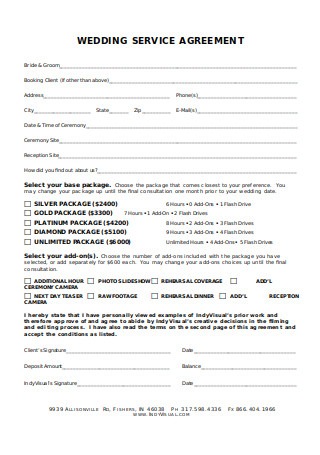
Wedding Service Agreement
download now -
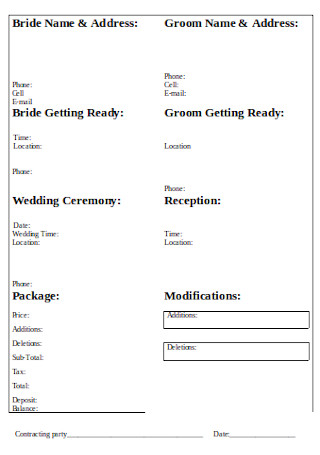
Simple Wedding Photography Contract
download now -
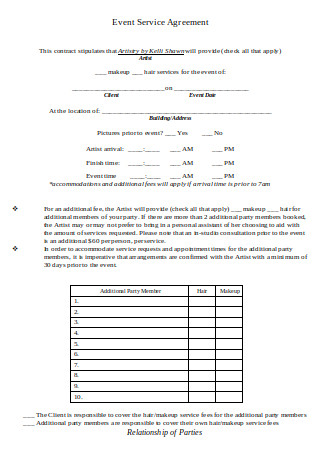
Event Service Agreement
download now -
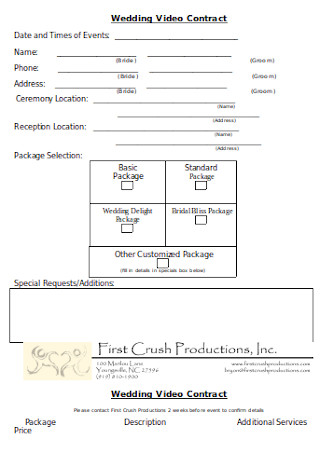
Wedding Video Contract
download now -
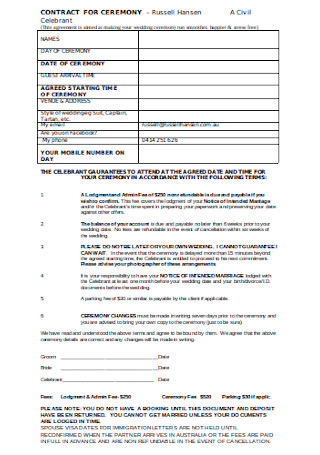
Contract for Ceremony
download now -
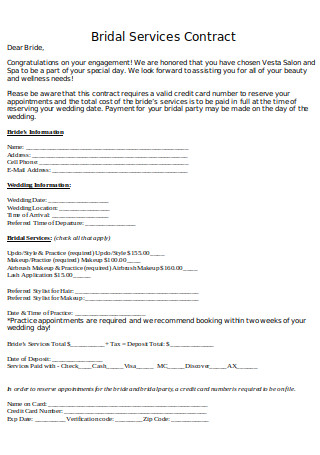
Bridal Services Contract
download now -
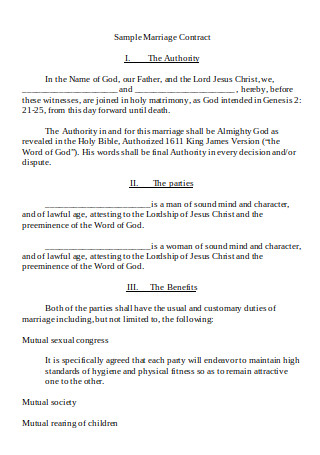
Sample Marriage Contract
download now -
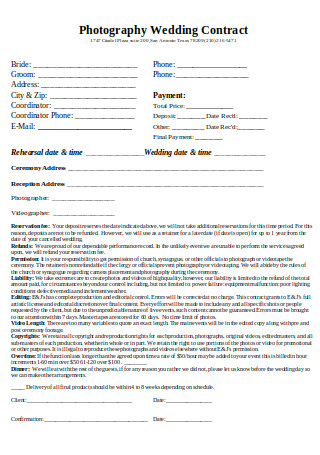
Photography Wedding Contract
download now -
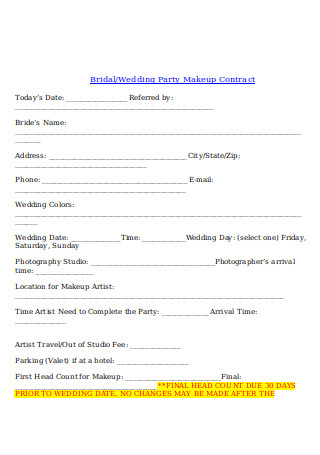
Wedding Party Makeup Contract
download now -
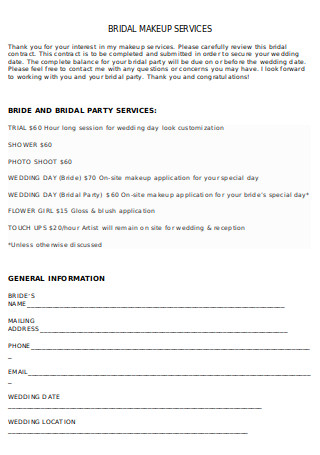
Bridal Makeup Services Contract
download now -
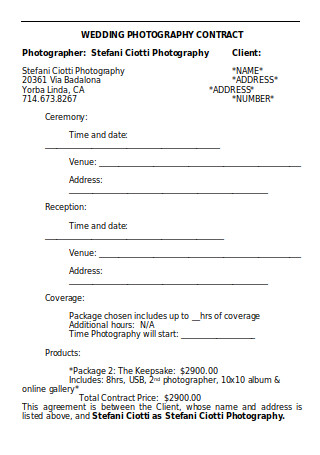
Wedding Photography Contract Sample
download now -
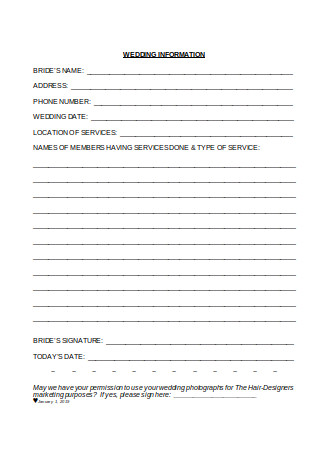
Hair-Designers Wedding Contract
download now -
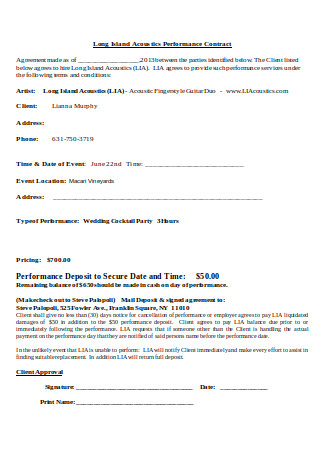
Acoustics Performance Contract
download now -
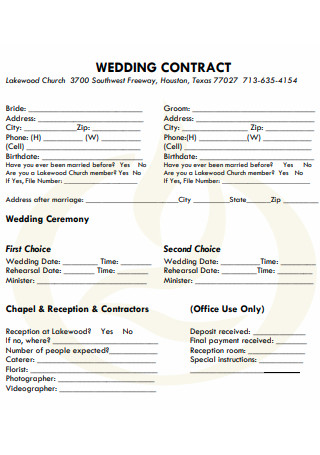
Wedding Contract Letter Head
download now -

Wedding Contract
download now -
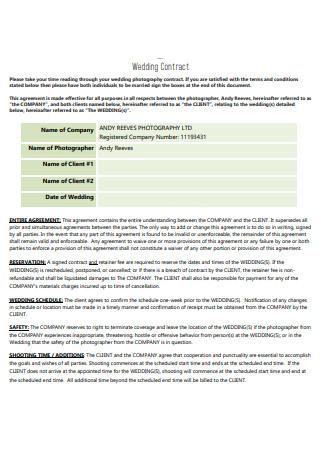
Wedding Contract Sample
download now -
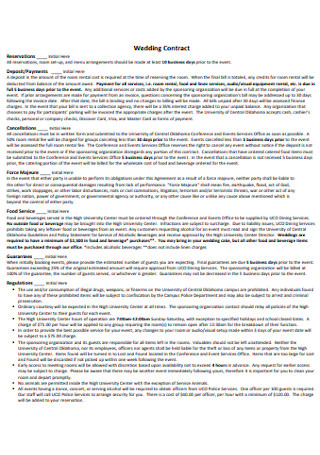
Wedding Contract in PDF
download now -
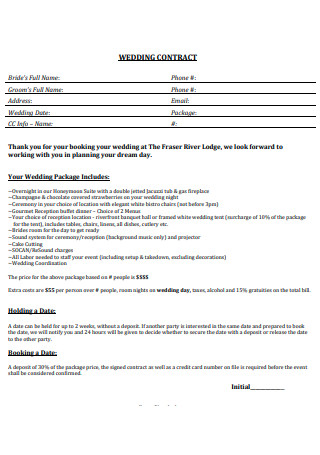
Basic Wedding Contract Template
download now -
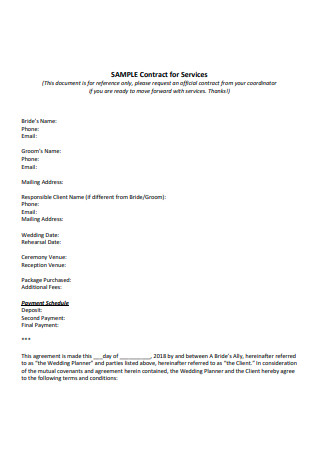
Sample Contract for Wedding Services
download now -
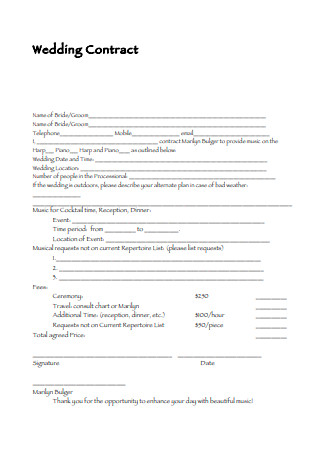
Wedding Contract Template
download now -
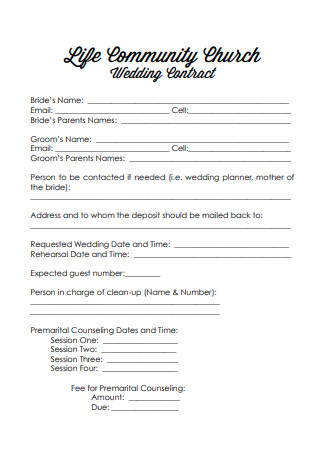
Wedding Contract Format
download now -
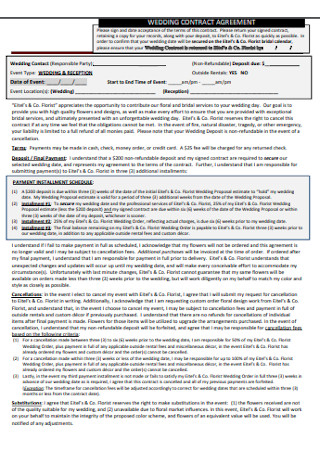
Wedding Contract Agreement
download now -
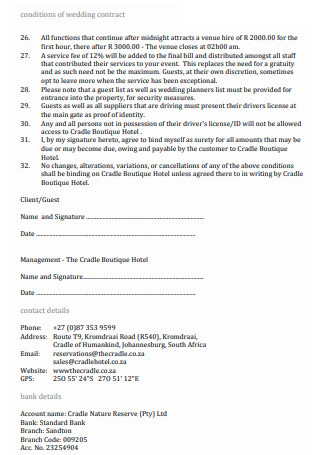
Wedding Hotel Contract
download now -
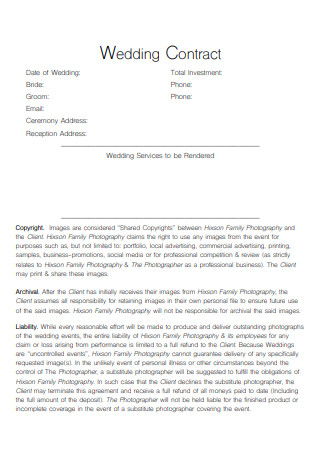
Professional Wedding Contract
download now
What Is a Wedding Contract?
When planning a wedding, signing a wedding contract permits you to receive a specific set of services from a vendor. These legally binding agreements help administer a wedding service professional’s relationship with a bride and/or groom. The document covers all the necessary points that concern the rights and obligations that each party expects the other to uphold throughout the contract period. However, parties must refrain from executing these terms until those involved in that agreement have signed it to confirm their acceptance.
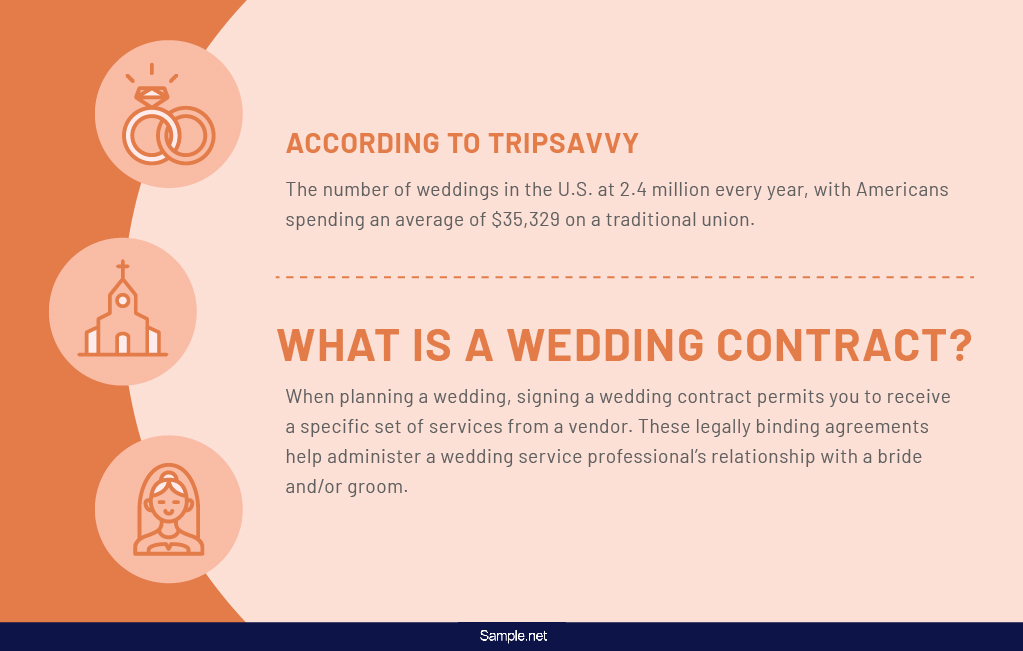
The Importance of Having a Wedding Contract
There’s nothing romantic about doing paperwork. But as much as you’d rather skip right to the cake-cutting and dress-fitting spirit, the least exciting part of wedding planning may be the most crucial one to prioritize—and that’s to have your wedding contracts signed.
Getting everything into a formal agreement is essential should you face any legal issues at some points during the planning process. But if you want your wedding to be everything you ever envisioned, you must understand the seriousness of having a wedding contract around to control the decisions you and a vendor make in planning a wedding. Apart from safeguarding your rights in the arrangement, here are some other reasons to have an event contract:
When to Use a Wedding Contract
Not many couples seem to see the value of a wedding contract. While you may not need a contract for every single detail of your wedding, it does pay to have one for certain cases. It doesn’t have to be lengthy, complicated, or written in legalese to make sense, as a simple contract beats not having a contract at all. And because we tailor these contracts according to the specific purpose they serve, you may want to take the following instances into account:
Planner
One of the first people you call to work on your dream wedding is a wedding planner. This is someone you can depend on when making important decisions and handling urgent matters surrounding your wedding, which are sometimes difficult to deal with on your own. But because of the weight of the responsibilities carried by a wedding planner, you should know that they have the power to make or break your plans.
Thus, it’s essential to have a wedding planner contract that specifies the scope of the job explicitly for all parties to comprehend. If you’re having a hard time deciding who to hire, you can refer to the details in their contract to compare terms, prices, and other demands that they may be willing to compromise for your sake.
Venue
If you’re renting out a private space for your ceremony or reception, you may need to sign a rental agreement with the property owner to use the location. This contract should protect the owner’s property from any damages caused by a renter, considering how rowdy some guests can be after one too many drinks. It may also address on-site restrictions and guidelines you and your wedding guests must comply with to avoid costly fees that could take a massive toll on the set budget. Seeing what a property owner lays down in the contract is also an opportunity for you to assess whether you should settle with what’s in front of you or continue exploring other options.
Catering
Some event venues don’t offer catering services along with their rental package, which would mean another service contract for you to worry about. You wouldn’t want your friends and family to spend the next few hours eating takeout food all because your caterer failed to show up. Whether it’s a simple refreshment stand or a full-blown buffet, you want to make sure you get everything you paid for without facing any significant issues. The wedding catering contract may include the meal price per head, corkage fees, overtime fees (for cooks and servers), and other essentials in the arrangement. You can even get an open bar while you’re at it.
Photography
Wedding photography is no joke. Notice how photographers take extreme measures for the perfect shot? All to create stories in the form of images and short films. From shooting to editing to delivery, there are several details in a wedding photography contract to look out for.
Start by discussing package prices and their inclusions. For instance, most agencies charge extra for destination weddings due to travel and equipment expenses. If you want to do a prenup shoot on foreign soil, but still have your ceremony at your local church, see if the price indicated in the contract covers such cases. Some brides and grooms might even request for digital DVDs or hardbound albums to be completed within the next 24 hours. While there’s a chance the team you hired could do it, the contract you signed probably forbids urgent orders and other unreasonable requests unless clients are willing to pay the extra charges. On the contrary, the agreement should also help you avoid sudden price changes in regular service offers.
What You Need to Know about Wedding Contracts?
To a vendor, executing a wedding contract is all part of the job. It’s an essential document that helps streamline business operations to make every couple’s dream come true. But it takes at least two parties to fulfill the terms of a contract. And from a client’s perspective, knowing how a contract functions during the event planning process is crucial for your big day to run smoothly.
Now that you’re about to enter into a series of legal agreements with different vendors, you want to make sure you do everything right. With that said, here are some guidelines to help you create a wedding contract.
1. Planning Makes Perfect
Before meeting with a vendor, discuss everything thoroughly with your partner. Now’s the best time to dig up the old Pinterest board you’ve been saving for years. You wouldn’t want to start negotiations without a game plan in hand; otherwise, you’ll find yourself sitting there, nodding at every event proposal presented to you. It’s always best to identify what you want and what you don’t want beforehand to avoid disagreements down the line. While the idea of making these requests might not sit well with you, leaving them unspoken will only make you regret not saying a word while you still had the chance.
2. Written Agreements Are a Must
Document everything. If you discuss your terms verbally and shake on it, a written version of the agreement must follow. Though the law does recognize verbal agreements, some contracts must be in writing to be enforceable. We all know the consequences that unwritten contracts bring to those that make them. The last thing you’ll want to do is to spend the last few hours before the ceremony arguing about the number of chairs at the venue. And even when you know you’re right about something, there’s no way to prove your claims with the lack of hard evidence. It’s a risk that may lead to costly outcomes for both parties.
If you’re worried about dedicating precious time to contract writing than the actual wedding planning, just remember that contracts can be as short and straightforward as you want them to be. Contract template forms are also available to help you cover the primary points of the agreements, while still leaving room for negotiations.
3. Prepare for the Worst
Although wedding cancellations don’t happen very often, it doesn’t mean it isn’t possible. Different factors, such as extreme weather conditions, unsafe environments, or personal misfortunes, may force you to change the date or location of your wedding. It’s even worse when one of your vendors cancel at the last minute due to disputes in the agreement or other unforeseen circumstances that you have no control over. Problems like these should remind you to ask about and inspect the cancellation policy defined in your wedding contract before signing. It would be good to know what could happen if either party cancels for you to prepare a contingency strategy just in case. Knowing you have a fallback in place will clear your mind of worry as your special day approaches.
4. Extra Copies Are a Lifesaver
Never sign a contract until the other party provides you with a copy of it. Contracts are tools that protect you from unwanted (and unsolicited) circumstances that could potentially ruin your big day. You never know when someone could tamper with the contract without you knowing. Should you forward the issue to court, the contract will serve as proof that the professional relationship exists and that an agreement had taken place at a particular time. It will also give you the chance to review any terms or conditions that you may have difficulty recalling, especially if it sparks any arguments with the vendor.
5. READ! READ! READ!
When entering a binding relationship with a vendor, regardless of the case, it’s essential to know what you’re getting yourself into before signing the contract. It’s a crucial fact that many couples fail to do from the get-go. If there are terms that seem unclear to you, don’t hesitate to ask questions. You shouldn’t feel obliged to sign a document if you don’t agree with everything it says, as you may end up paying for something that has nothing to do with your priorities as a client.
Additionally, watch out for verbal explanations that fail to reflect what’s written in your agreement. How you understand the terms and conditions of the contract should match that of the other party, and not based on your mere assumptions. It’s a crucial factor that you must take into account as you continue to negotiate on what’s best in the arrangement. Bear in mind that a contract has the power to govern the course of your relationship and how it all works out, so you could be putting yourself at a vulnerable state if you make the rash decision to sign the contract with your eyes closed.
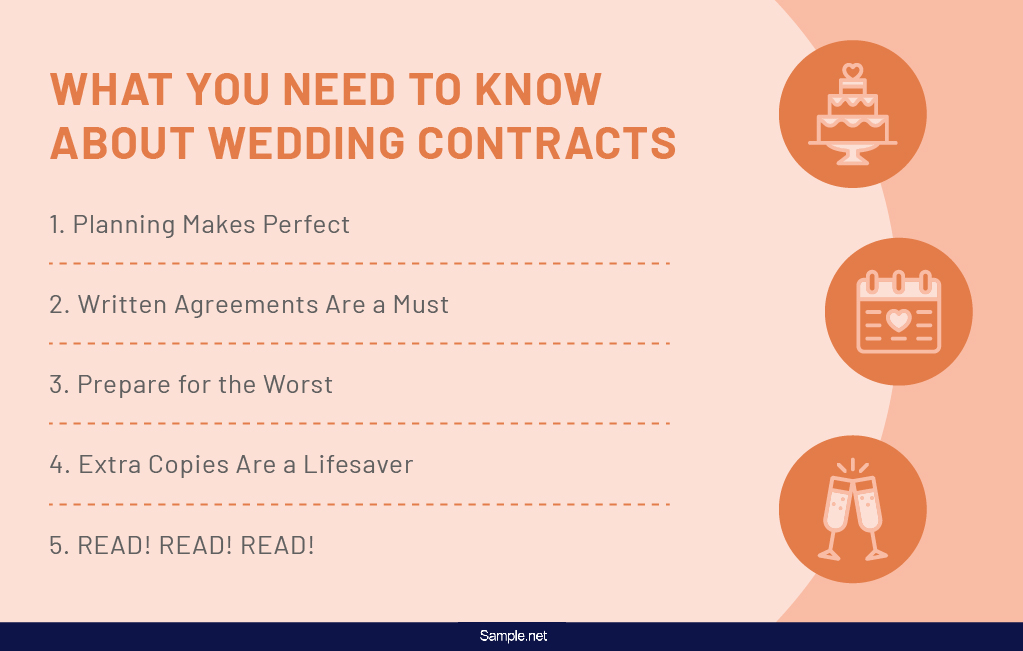
At the end of the day, you can never be too sure about whether a vendor is capable of delivering what they promised. You can choose to take the risk with a verbal agreement or not, but if you’re looking for a sign to get it in writing—this is it. Everything has a better chance of coming together as planned when you have a contract to guide you. So while it may seem intimidating at first, you can’t deny the sense of security that wedding contracts bring as you begin preparing for your big day.
